
Are you looking for the best eCommerce platform in Malaysia to advertise your products?
Choosing the perfect eCommerce platform is crucial for your online store’s success. With the eCommerce market expected to hit $6.54 trillion globally by 2023, it’s never been more important to select the best platform to meet your business needs.
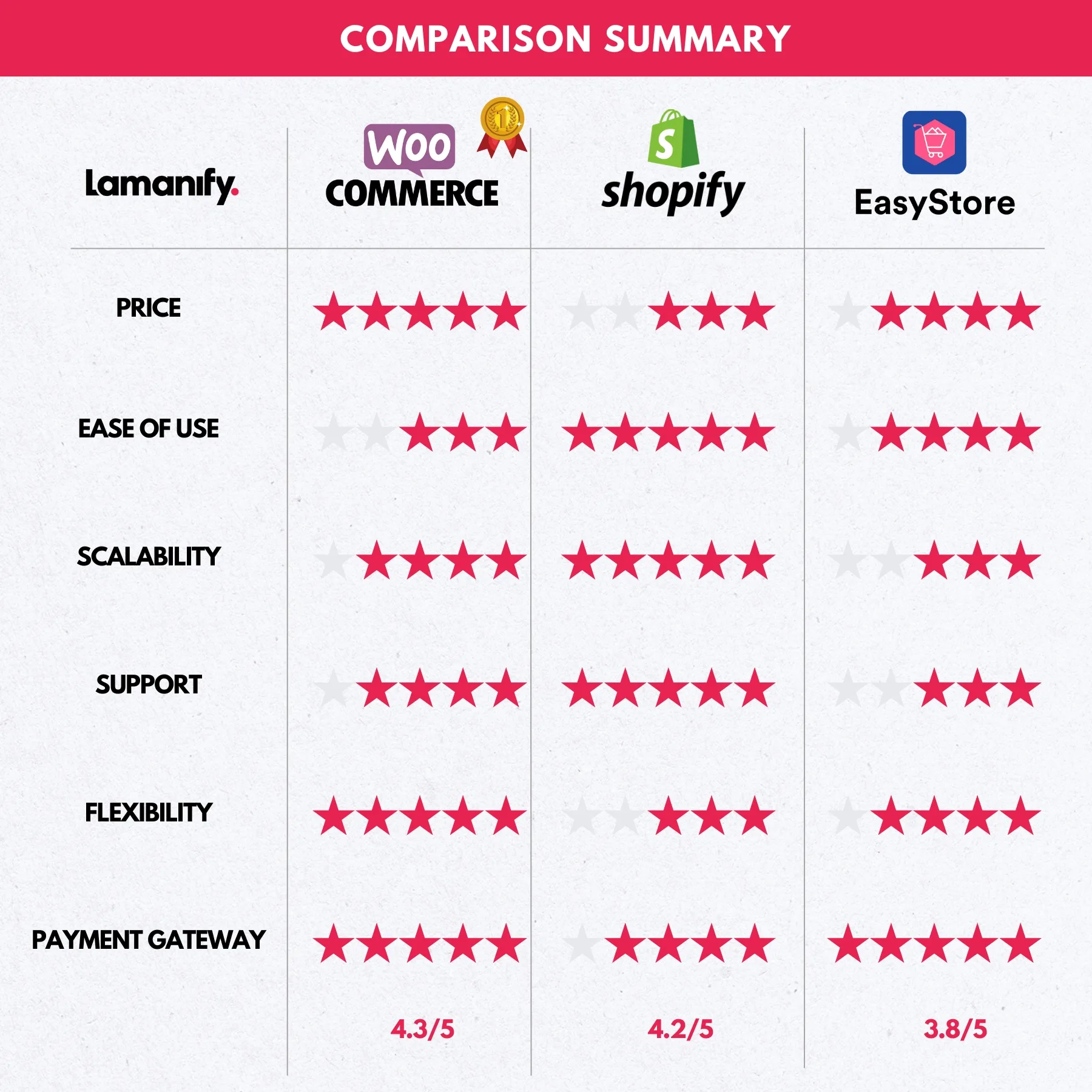
In this ultimate showdown, we’ll dive deep into the features, pricing, and performance of three eCommerce giants – Shopify, WooCommerce, and EasyStore. Will Shopify’s all-in-one solution win the day, or will the flexibility of WooCommerce or the simplicity of EasyStore come out on top?
Keep reading this article to reveal the right eCommerce platform for your online store and unlock its full potential.
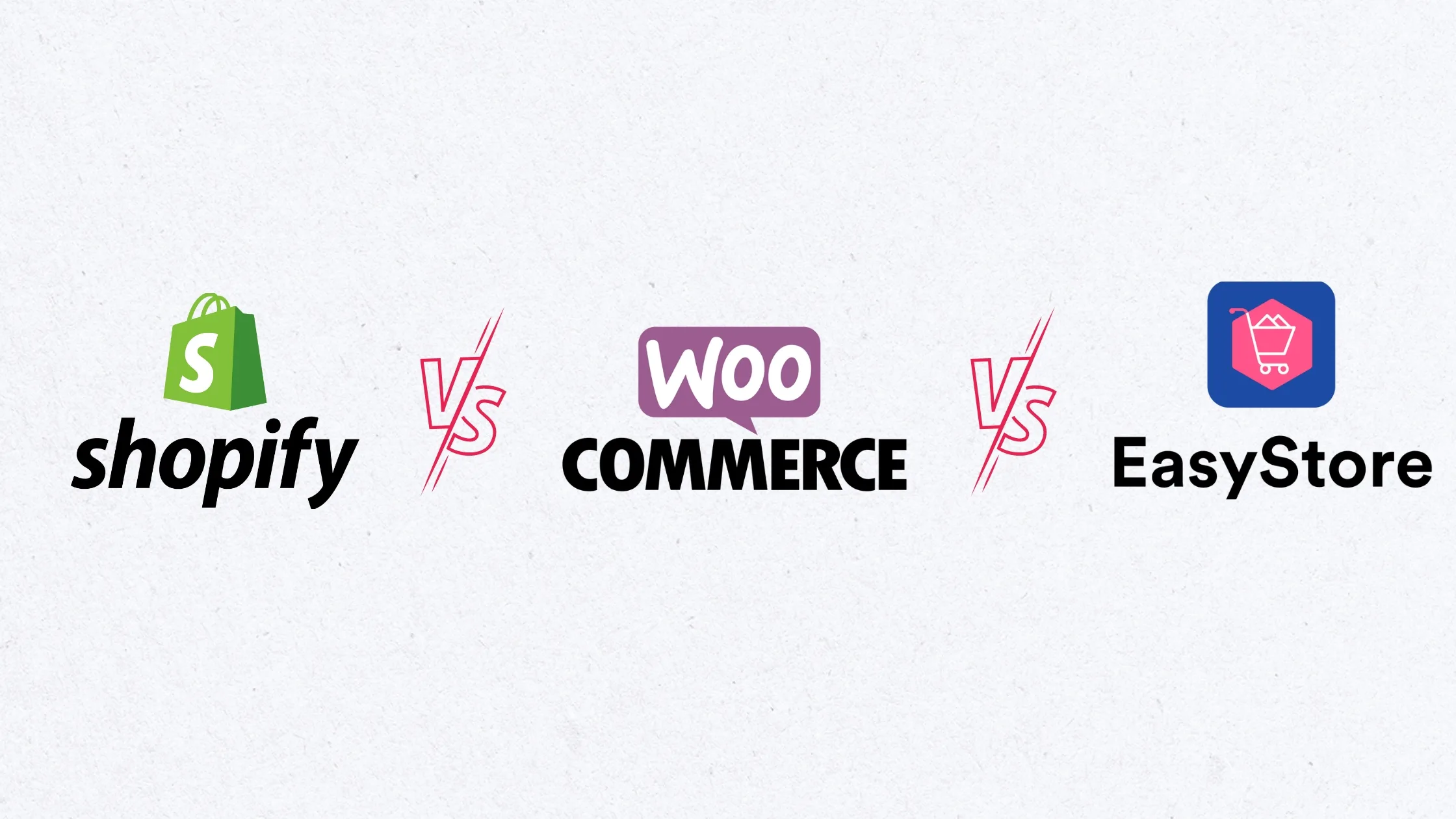
Before thoroughly comparing Malaysia’s three top eCommerce platforms, it’s crucial to understand the basics and discover what sets them apart.
Introducing WooCommerce
WooCommerce with the quote “The ecommerce platform that grows with you”, is a versatile, open-source eCommerce plugin designed for WordPress. It enables you to harness the might of the world’s most versatile and popular content management system (CMS) to operate an online store.
According to data from W3Techs, a website that tracks the usage of different technologies, WordPress is responsible for powering 43.2% of all websites. Surprisingly, to some, WooCommerce is the most popular eCommerce platform (yes, even more so than Shopify).
Thanks to its open-source nature, WooCommerce allows you to customise every aspect of your store and effortlessly add custom extensions. Wondering if WooCommerce is the right eCommerce platform for you? Read on!
Introducing Shopify
Shopify is an all-inclusive eCommerce platform that simplifies creating an online store, processing payments, and managing your inventory from one platform.
Launched in 2006, Shopify provides an all-in-one solution to help entrepreneurs create, manage, and grow their online stores with ease.
With its user-friendly interface, extensive app ecosystem, and robust features, it’s no wonder that Shopify has generated over $200 billion in sales. Read on to discover if Shopify is the right match for your business.
Introducing EasyStore
EasyStore is a cloud-based eCommerce platform that allows users to easily create an online store without requiring technical knowledge or experience.
The platform offers a range of features, including website design templates, payment processing, inventory management, and marketing tools.
EasyStore is designed to be user-friendly, with a drag-and-drop interface that makes it easy to customise your store’s design and layout.
The platform also offers integrations with popular Malaysia payment gateways, shipping providers, and marketing tools, making it a convenient all-in-one solution for small businesses and entrepreneurs. Do you think EasyStore is the perfect match for your small business? Let’s read this article to the end.
Several essential aspects must be remembered when embarking on your online store journey. These crucial elements will help you determine which platform best fits your requirements.
Budget – The initial expense of launching a fully operational eCommerce store.
User-friendliness: The platform should be effortless, even for complete novices.
Payment Methods: The platform should support various payment methods (e.g., FPX, Bank Transfer, DuitNow, PayPal, Credit/Debit Cards, Stripe, and other payment processors).
Integrations: The number of services and third-party tools that can be integrated to expand your eCommerce business.
Scalability: The platform should be able to grow alongside your business.
All online store owners must consider these fundamental requirements.
However, depending on your specific needs, you should explore other options like shipping, inventory management, invoicing, taxes, dropshipping, etc.
This article aims to delve deep into how Shopify, WooCommerce and EasyStore meet these basic requirements and determine the most suitable for your needs.
With that said, let’s begin our Shopify vs. WooCommerce vs. EasyStore comparison.
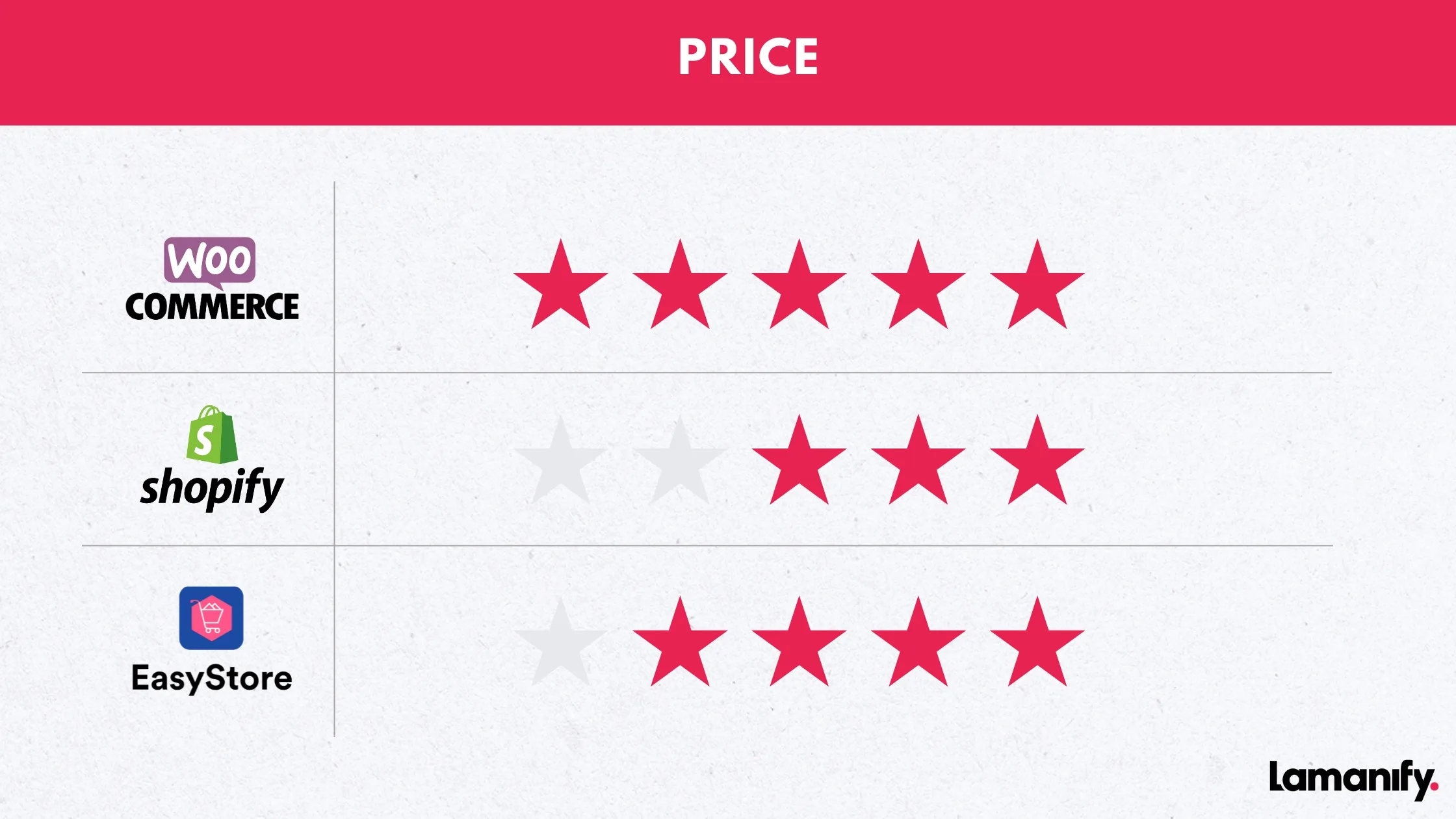
For eCommerce website owners, cost is often the most critical factor. It’s essential to assess the initial costs while considering the variable expenses for add-on services and software.

WooCommerce is an eCommerce plugin designed for WordPress.org (commonly referred to as self-hosted WordPress). As an open-source solution, it is available as a free eCommerce platform.
To launch a WooCommerce store, however, you’ll need a domain name and a hosting account.
Generally, a domain name costs $14.99 (RM65), and web hosting is approximately $7.99 (RM40/mo) per month. These expenses can be daunting, especially for newcomers.
Fortunately, several hosting companies now offer specialised WooCommerce hosting plans that significantly lower costs. At Lamanify, we provide Cloud Hosting (a premium WordPress hosting) as a reliable, efficient and scalable eCommerce solution for our customers.
If you’re looking for an affordable but high-quality server, Hostinger, an official WordPress and WooCommerce-recommended hosting provider, has agreed to provide our users with a free domain name, a free SSL certificate, and a discount on web hosting.
This offer enables you to establish your online store for as low as $2.99 (RM13.99/mo) per month.
Comparatively, the cost of initiating a basic WooCommerce store is considerably less than Shopify. Additionally, WooCommerce does not charge a percentage fee on transactions, which is a substantial advantage.
It’s crucial to remember that WooCommerce expenses begin to accumulate as you purchase paid extensions. Your hosting costs will also rise as your online store expands.
However, a significant benefit of using WooCommerce is the frequent availability of free alternatives to premium themes and paid extensions. You can also manage your expenses by only purchasing the necessary tools and plugins. At Lamanify, we’ve always advised our clients to utilise as many free plugins as possible to achieve the desired result before purchasing any paid plugins.
Considering the numerous free themes and add-ons available for WooCommerce, it undoubtedly takes the lead in terms of cost.

Shopify simplifies the process of launching your online store. Their Basic plan starts at $19 (~RM85/mo) per month, and you can upgrade to the Shopify plan for $49 (~RM218/mo) or the Advanced Shopify plan for $299 (~RM1,330/mo) per month.
These plans include an SSL certificate, web hosting, and a Shopify-branded subdomain (e.g., https://your-store.myshopify.com).
If you prefer to use your .com domain name, you must purchase it separately. The pricing for a standard .com domain typically starts at $14 (RM63) per year.
The Basic Shopify plan provides good features for a new online store. You can add unlimited products, have two user accounts, and have free SSL certificates, among other features.
However, this pricing does not cover third-party tools and add-ons necessary to elevate your Shopify store. As your business expands, these costs accumulate, and you’ll eventually pay significantly more than the basic plan.
Payment processing is another cost factor. Shopify offers its own Shopify Payments solution, which charges 2.0% per transaction for the basic plan.
If you decide to use third-party payment gateways or your own merchant account, you’ll incur a 2.0% flat fee for all transactions. By opting for the Shopify Advanced plan at $299 (~RM1,330/mo) per month, you can reduce this fee to 0.5%.
When using external payment gateways, these payment processing fees can be quite high. However, if you’re just starting and want to use the Shopify Payments solution, the fees are relatively similar to popular platforms such as Stripe and Braintree.
Shopify also has a Shopify Starter Plan, which costs $5.00 (RM23/mo) per month. This plan enables you to add buy buttons to any site or use Shopify for in-person sales in selected regions.
For example, you can create a WordPress website and incorporate Shopify buy buttons. However, if you’re already using a WordPress website, WooCommerce would provide a superior user experience.

EasyStore offers a variety of pricing plans, starting from $25 (RM59/mo) per month for their Lite plan, $74 (RM199/mo) per month for their Standard plan, and $149 (RM399/mo) per month for their Business plan.
All of these plans include unlimited products, bandwidth, storage, and support, as well as access to various eCommerce features such as abandoned cart recovery, discount codes, and social media integrations.
However, the pricing does not cover the cost of payment processing fees or any third-party apps and add-ons that you may want to use to enhance your store’s functionality.
Payment gateway’s processing fees range from 2.5% to 4% per transaction, depending on your payment gateway. However, note that EasyStore does not charge any transaction fee on top of what the payment gateway charges.
Furthermore, if you need more advanced features or customisation options, you may need to hire a developer or pay for additional integrations, which can add up over time.
EasyStore also offers a free 14-day trial, allowing you to test out their platform before committing to a paid plan. However, after the trial ends, you will need to subscribe to a plan to continue using the platform.
Winner: WooCommerce
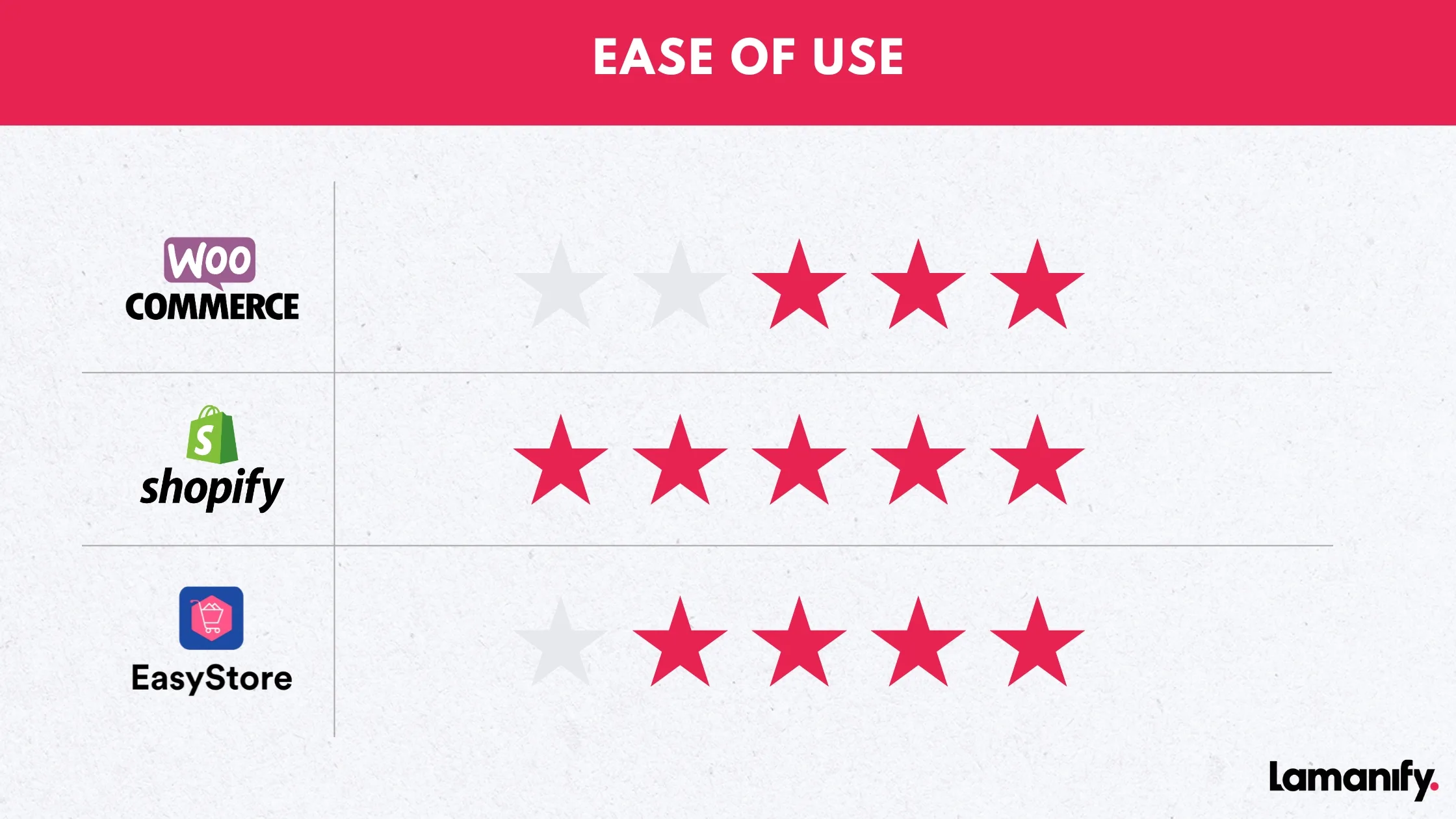
Most people launching an online store are neither web designers nor developers.
Even those with a basic understanding of these concepts require a platform that is simple to navigate and helps their progress.
Let’s compare Shopify, WooCommerce and EasyStore regarding ease of use.

In contrast to hosted platforms like Shopify, WooCommerce operates as a self-hosted solution. This means that you will be responsible for installing the WooCommerce plugin, managing updates, maintaining backups, and safeguarding your website’s security.
However, a vast array of both free and premium plugins are available to streamline and automate the majority of these tasks, simplifying the overall process.
One of the standout features of WooCommerce is its remarkable adaptability, offering you total control over your online store. With access to over 59,000+ WordPress plugins, you can effortlessly integrate a wide range of functionalities into your website, tailoring it to your specific needs and preferences.
To further enhance the ease of use, each plugin comes with its own comprehensive documentation. This invaluable resource guides you through the proper usage, updates, and troubleshooting, ensuring a seamless and user-friendly experience as you build and manage your ecommerce store with WooCommerce.

Shopify eliminates the need to install, manage, or update any software as a fully hosted platform. Additionally, you won’t have to concern yourself with security, performance, backups, or compatibility matters.
Once you sign up, you can select a design from various free Shopify themes. Following this, they guide you through customisation and product addition.
Shopify boasts an intuitive drag-and-drop interface, making it easy to manage your product pages, sales, and inventory.
A drawback of this streamlined, polished, and highly optimised user experience is the limitation on your control.
You’re restricted to using Shopify’s design and development tools or add-ons in their marketplace.
Nonetheless, this constraint isn’t as limiting as it may seem. For most users, Shopify’s extensive array of extensions and themes is sufficient (don’t forget the cost!) to establish and expand an online store.

Similar to Shopify, both are designed to enable users to establish an online store with minimal effort, even for those who possess little to no coding experience.
This user-friendly approach is exemplified by the inclusion of pre-designed theme templates and an intuitive dashboard, which streamline the store setup process.
Additionally, both platforms offer customisation options through their theme liquid framework, empowering merchants to fine-tune their websites according to their unique preferences.
One notable advantage of EasyStore is its emphasis on catering to local markets.
As a result, EasyStore is highly adept at guiding users through the various aspects of the setup process specific to their region, including localised sales channels, payment gateways, and shipping solutions.
This targeted approach ensures that merchants can easily tailor their online store to meet the needs and expectations of their customer base, contributing to the platform’s overall ease of use.
Winner: Shopify
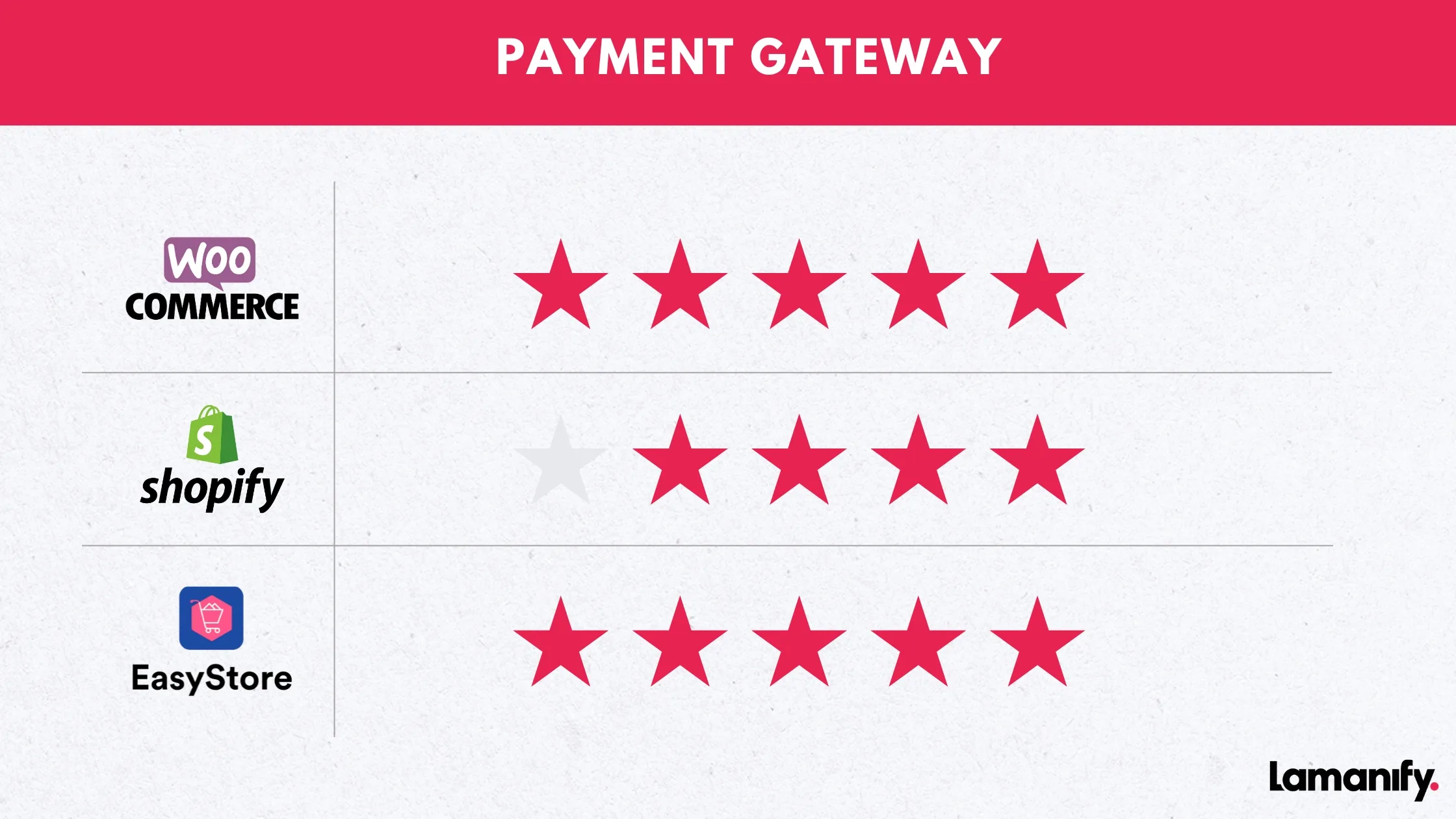
A variety of payment gateways exist for processing online transactions.
Certain payment methods might not be appropriate for your needs, while others may be inaccessible to your customers.
Hence, it’s crucial to select a platform that provides an array of payment alternatives. Let’s examine how Shopify, WooCommerce and EasyStore measure up in terms of payment integration capabilities.

Shopify presents an array of payment options for customers to utilise during checkout. It features its own payment solution, Shopify Payments (powered by Stripe), in addition to widely-used third-party payment gateways.
However, Shopify imposes an additional 2% fee on each transaction processed via third-party payment gateways, which is in addition to the fees charged by the gateway itself.
By subscribing to the Advanced Shopify plan for $399 per month, you can reduce this fee to 0.5%.
While Shopify Payments includes credit card fees, it does not impose other transaction fees. Credit card rates begin at 2.9% + 30¢ for the basic plan, with lower rates available for other plans.
According to Shopify, they support a wide variety of plugins, including Online Banking (FPX), credit/debit cards and Paypal.

WooCommerce, unlike Shopify or EasyStore, is an open-sourced platform, offering seamless integration with various third-party payment gateways, making it an ideal choice for businesses in Malaysia.
By incorporating Online Banking (FPX), Bank Transfer, PayPal, Stripe, Credit/Debit Cards, and other popular options, Malaysian ecommerce store owners can ensure a frictionless and secure shopping experience for their customers.
One of the key advantages of WooCommerce is the simplicity of integrating these payment gateways. With numerous dedicated plugins available, store owners can easily enable and configure their preferred payment methods without any coding expertise. This streamlined process allows merchants to focus on other aspects of their online store while ensuring a smooth checkout experience for their customers.
FPX, or Financial Process Exchange, is a particularly popular payment method in Malaysia, as it supports transactions through major Malaysian banks. By integrating FPX with WooCommerce, businesses can cater to the local market by providing a familiar and trusted payment option.
Furthermore, international payment gateways such as PayPal and Stripe offer Malaysian ecommerce store owners the opportunity to expand their reach beyond the local market. These platforms facilitate transactions in multiple currencies and adhere to stringent security standards, instilling confidence in both merchants and customers.

EasyStore offers a wide range of payment options for customers during checkout. The platform supports integration with numerous popular payment gateways, including PayPal, Stripe, and more.
Additionally, it accommodates various regional and less-common payment gateways to cater to a diverse audience, like FPX, Online Bank Transfer and Cash On Delivery.
EasyStore does not impose any additional transaction fees on top of the fees charged by the payment gateway itself. This makes it a cost-effective choice for merchants looking to minimise transaction expenses.
The chosen payment gateway determines credit card rates and other fees, so it’s essential to compare various providers when deciding on the best solution for your online store.
Winner: Woocommerce
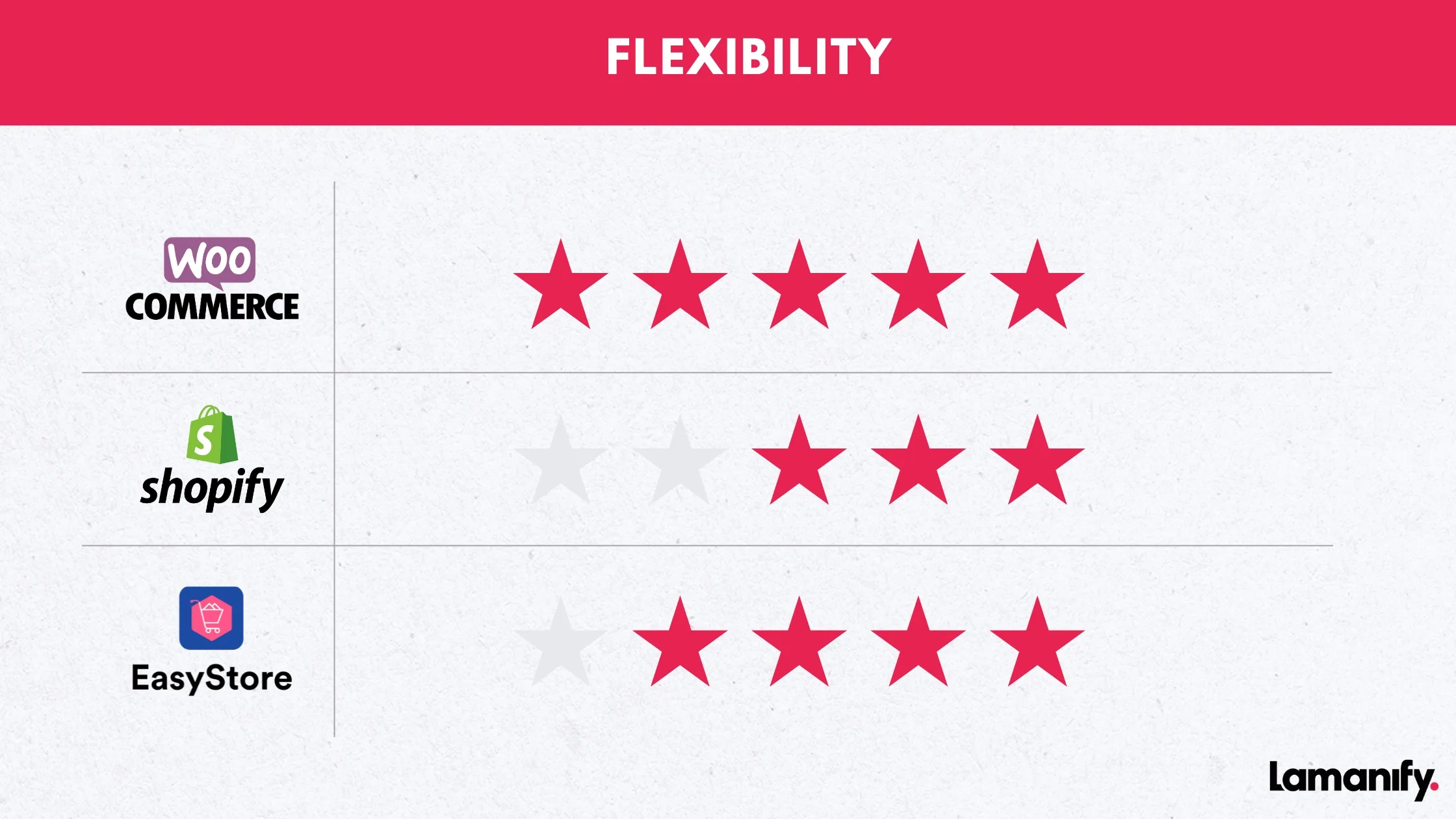
Regardless of how comprehensive an eCommerce platform may be, flexibility to have integrations and addons are essential for expanding your store. These may include email marketing software, lead generation tools, analytics tools, and outreach services.
Shopify, WooCommerce and EasyStore offer an extensions directory and allow integration with numerous third-party solutions.

Shopify boasts a robust API and an App Store, providing access to numerous third-party add-ons for your Shopify store. The store features hundreds of apps addressing various functionalities you may wish to include in your store.
For lead generation, integrations with software like OptinMonster are available to help expand your email list and minimise cart abandonment. Shopify also offers apps for search engine optimisation, product reviews, discounts, countdowns, and more.
The Shopify App Store includes both free and paid apps. Typically, third-party services develop free apps with their own pricing structure, and the app serves to connect your store to their APIs. Paid add-ons’ pricing varies, with the majority offering monthly subscriptions.
When comparing the number of add-ons and extensions available, Shopify has fewer options than WooCommerce/WordPress. This is primarily due to the challenge of getting an app listed in their store.
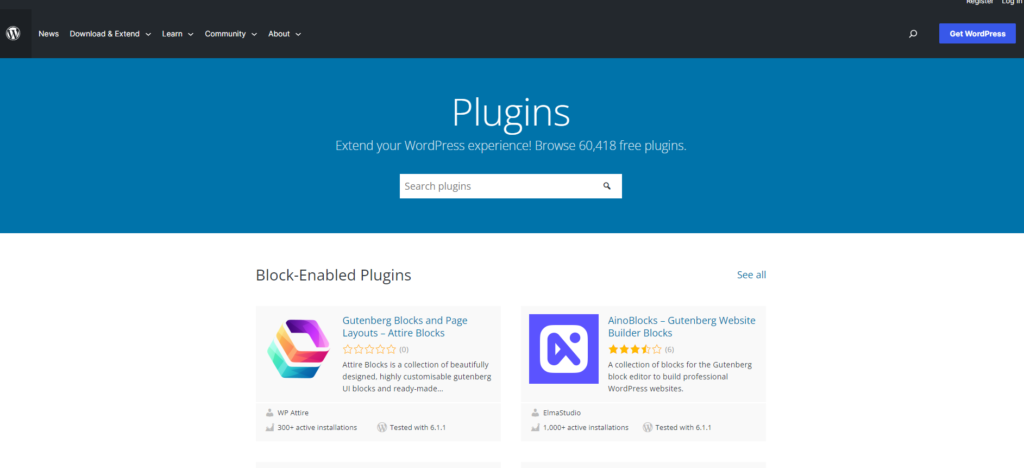
As an open-source platform built on WordPress, WooCommerce is able to integrate with more than 60,400 free WordPress plugins and numerous paid ones.
These add-ons enable the addition of payment gateways, lead generation, eCommerce SEO, performance optimisation, social media integration, and countless other features.
The lower barrier of entry means that WooCommerce offers significantly more integrations and add-ons than Shopify. Almost all third-party tools and service providers have plugins for seamless integration with WooCommerce stores.
We recommend the following top WooCommerce plugins:
OptinMonster – Effortlessly create pop-ups to reduce cart abandonment, increase sales conversions, and grow your email subscriber base.
RankMath – A comprehensive SEO toolkit to promptly optimise your online store for improved search engine rankings and increased traffic.
PixelYourSite- The premier tracking plugin for easy tracking of eCommerce data directly from your WordPress/WooCommerce dashboard. Support Google Analytics, Facebook Pixel, Google Ads, Pinterest and custom tracking codes as well.
Kadence – A leading drag-and-drop page and theme builder for WordPress, integrating with WooCommerce to customise checkout pages, carts, product grids, and more.
CartFlow – A robust WooCommerce funnel builder for creating high-converting checkouts, Shopify-style sliding side carts, one-click upsells, order bumps, and more.
Mailerlite Integration – Conveniently develop automated email marketing and SMS campaigns for abandoned cart reminders, subscription reminders, and more within WordPress.
Advanced Coupons – The ultimate coupon plugin to enhance WooCommerce’s coupon functionality and craft better offers to boost sales.
LiteSpeed Cache – To improve web loading speed and customer experience when customers browse the site.
Comparing the processes of submitting a plugin for WordPress and an app to the Shopify store, we can confirm that the latter is significantly more challenging.
You may also consider hiring a WordPress developer to create a custom integration or plugin for your website.

EasyStore features a growing apps marketplace, offering access to a variety of third-party add-ons for your EasyStore shop. The marketplace includes apps that cater to different functionalities you may want to implement in your store.
For lead generation, integrations with email marketing software like Mailerlite, Mailchimp and Onvoard are available to help grow your email list and reduce cart abandonment. EasyStore also provides apps for search engine optimisation, product reviews, discounts, and more.
The EasyStore Apps Marketplace includes both free and paid apps. Generally, free apps are developed by third-party services with their own pricing structures, and the app serves to connect your store to their APIs. Paid add-ons’ pricing varies, with many offering monthly subscriptions.
When comparing the number of add-ons and extensions available, EasyStore currently offers fewer options than WooCommerce and Shopify. However, as the platform continues to grow, more third-party developers are expected to create apps catering to EasyStore’s user base.
WooCommerce and Shopify remain more established in terms of available integrations and add-ons. However, EasyStore is an emerging platform with a growing selection of third-party tools and services, making it a competitive option for merchants seeking a versatile eCommerce solution.
In summary, it is essential to remember that WooCommerce is considerably more customisable than Shopify.
Winner: WooCommerce
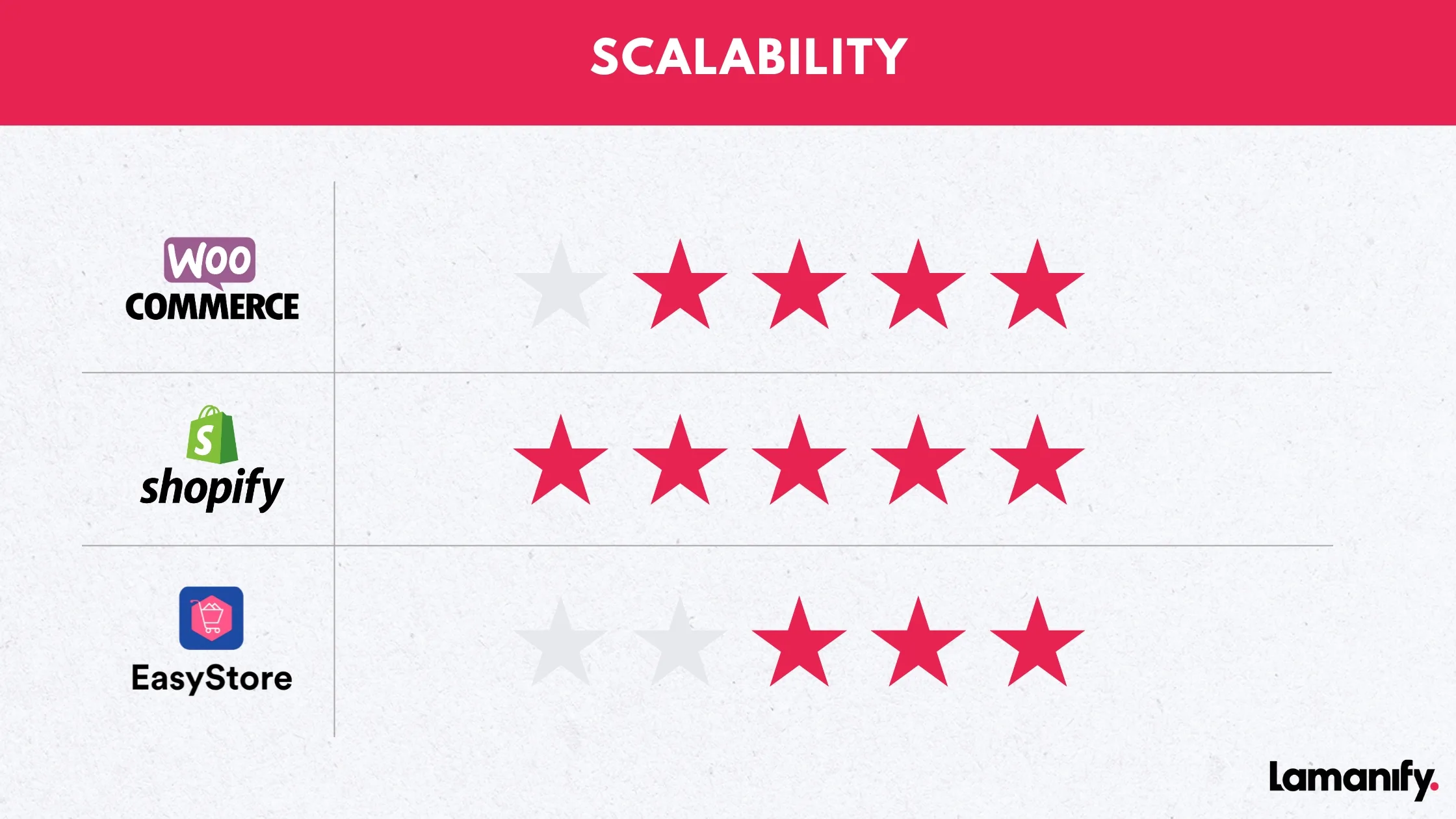
The phrase “growing pains” is no stranger to many CEOs and founders. As a business expands, additional resources are required to address new objectives and challenges.
Shopify, WooCommerce and EasyStore possess the capability to scale with increasing traffic and order volumes; however, they differ in certain aspects. Let’s examine the distinctions between these three eCommerce platforms concerning scalability.

Shopify manages the technical aspects of your store, ensuring you never have to be concerned with performance, security, or scalability. As your business expands, all you need to do is upgrade your Shopify plan.
Shopify’s infrastructure is designed to effortlessly accommodate your growing enterprise, eliminating concerns about downtime, backups, updates, or security. Additionally, enterprise services are available through the Shopify Plus plan.
While this removes some of the challenges associated with growth, it also contributes to an increase in business expenses. As costs rise, careful planning becomes essential.
The upside is that these expenses are balanced by the absence of needing to recruit or oversee an in-house technical team.

WooCommerce offers a highly customisable and flexible solution for scaling up your online store, providing you with unparalleled control and cost-efficiency compared to Shopify.
As your business grows, WooCommerce allows you to adapt and expand your store according to your specific needs without being tied to a predetermined plan.
Built on the robust WordPress platform, WooCommerce ensures that you have access to a vast ecosystem of plugins, themes, and developers that can help you optimise your store’s performance, security, and scalability. This open-source approach puts you in the driver’s seat, enabling you to fine-tune every aspect of your store as you see fit.
While WooCommerce may require more hands-on management compared to Shopify, the trade-off is greater freedom to control costs, as you can choose the hosting, services, and features that best align with your budget and growth trajectory. This flexibility allows for more strategic planning and resource allocation, ensuring that you’re only investing in what truly benefits your business.
Moreover, WooCommerce’s thriving community and extensive resources mean that you can find expert help and support whenever you need it without relying on an in-house technical team. This empowers you to focus on scaling your business, knowing that your WooCommerce store can grow and adapt alongside it.

EasyStore takes care of the technical aspects of your store, so you don’t have to worry about performance, security, or scalability. As your business grows, upgrading your EasyStore plan is all you need to do.
EasyStore’s infrastructure is built to handle the growth of your business seamlessly, alleviating concerns about downtime, backups, updates, or security. This allows you to focus on managing your store and meeting customer demands.
While the platform handles the technical side of scaling, it’s essential to plan for the increasing costs associated with growth. However, these expenses are offset by not having to hire or manage an in-house technical team.
The simplicity of scaling with EasyStore may appeal to small businesses that prefer a more straightforward solution similar to Shopify.
Winner: Shopify
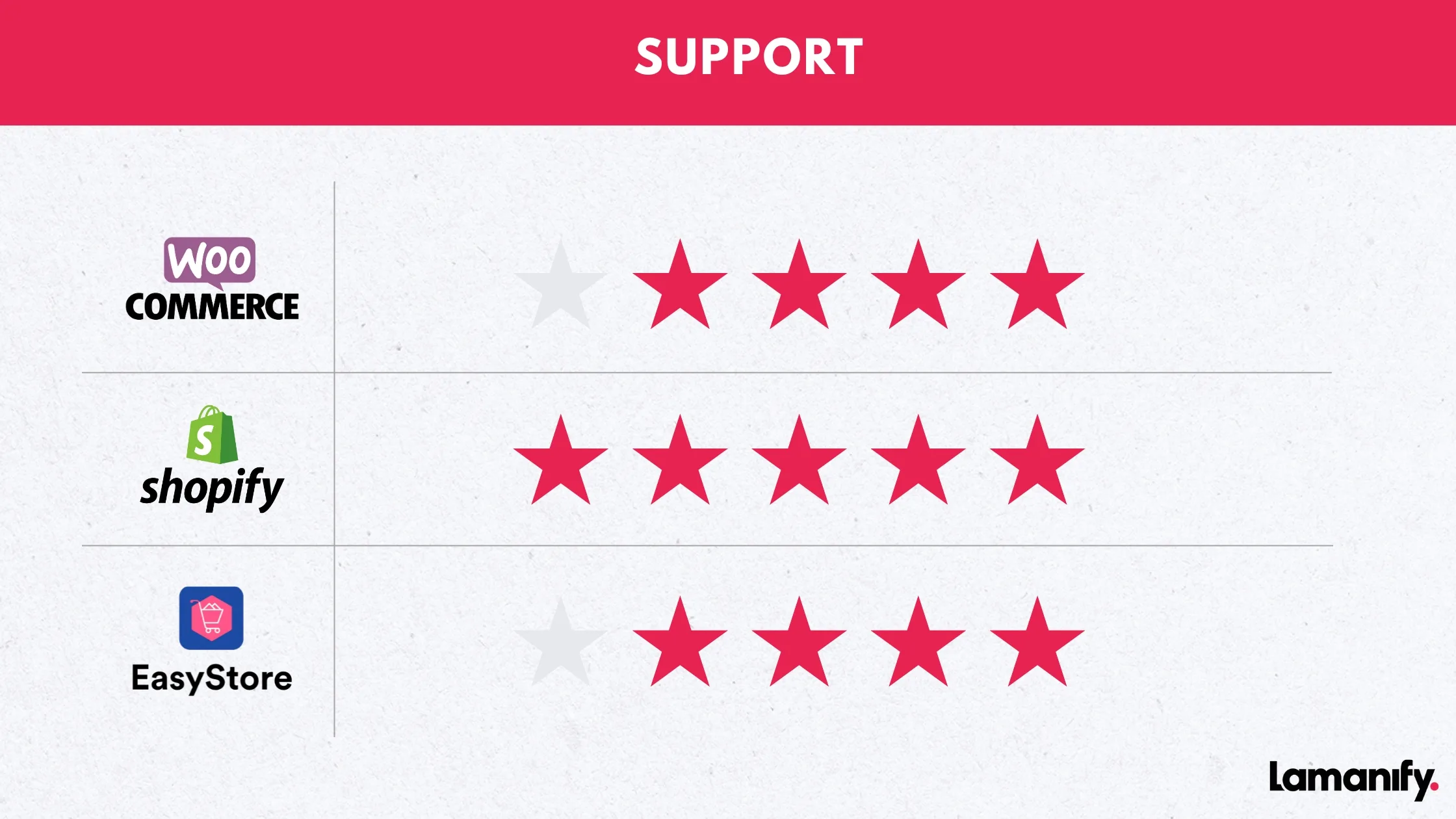
WooCommerce, Shopify and EasyStore are all user-friendly platforms.
Nevertheless, there may be instances where you require assistance in implementing new features in your store.
Let’s explore how WooCommerce, Shopify and EasyStore approach support and the various avenues they provide to obtain help when necessary.

As a fully hosted platform, Shopify has full control over its software and possesses in-depth knowledge of its system.
Shopify offers 24/7 customer assistance through live chat, phone, email, and Twitter. For those who prefer to resolve issues independently, Shopify provides comprehensive documentation, how-to guides, a knowledge base, video tutorials, and forums.
Additionally, Shopify maintains a directory of Shopify Experts available for hire if you require extra help or wish to integrate third-party solutions.
However, it’s important to note that Shopify does not offer support for third-party apps or templates in use.

As the world’s leading eCommerce platform, WooCommerce offers a wealth of support options to assist you when necessary. The WordPress forum is the go-to place for any support that you require on any of your Woocommerce plugins and addons.
The official website features comprehensive documentation, tutorials, and guides for self-help. Additionally, support forums are available, where the WooCommerce support team, along with other users and experts, can provide assistance.
WooCommerce has recently introduced 24/7 chat support for customers who purchase any premium extension or theme from WooCommerce.com.
However, as a self-hosted platform, WooCommerce relies on your hosting provider to address server-related issues.
Regarding third-party WordPress themes and extensions, the respective developers are responsible for addressing support inquiries related to their products.
Given its widespread popularity, finding developers to resolve issues with your WooCommerce store is often both easier and more cost-effective.
Freelancing websites are excellent resources for locating developers who specialise in WooCommerce solutions.
At Lamanify, we take good care of our client’s Woocommerce store to ensure peace of mind and a smooth-running eCommerce store.

EasyStore is committed to providing a smooth and hassle-free experience for its users by offering a range of support options to address their needs.
The comprehensive Help Center features articles, guides, and tutorials to assist users in navigating the platform and resolving common issues. For personalized assistance, users can reach out to the dedicated support team via email or access instant help through the live chat feature during business hours.
The active community forum allows users to engage with fellow EasyStore enthusiasts, sharing valuable tips and solutions. Additionally, EasyStore maintains a strong presence on popular social media platforms like Facebook and Twitter for updates, announcements, and extra support.
With these diverse support options, EasyStore ensures users have the resources they need to effectively manage and grow their online stores.
Winner: Shopify
All three, Shopify, WooCommerce and EasyStore, are powerful options for launching your eCommerce store, with the choice ultimately depending on your skills and preferences.
Shopify and EasyStore excels in user-friendliness, requiring no installation and enabling quick store set-up. Payment configurations are straightforward, and the platform offers easy-to-understand pricing plans.
However, Shopify’s and EasyStore’s drawbacks include limited control over certain aspects, potential increases in costs due to transaction fees, add-ons, and integrations, and restricted upgrade options. Additionally, it doesn’t allow for cost management based on business growth.
WooCommerce, as an open-source and self-hosted, provides full control over your website and a more cost-effective approach to starting an online store, especially when using WooCommerce hosting companies.
If you prioritise a cost-effective solution with complete control over your online store with long-term growth in mind, WooCommerce is your optimal choice.
Conversely, if you seek a hassle-free experience with unlimited scalability, both Shopify and EasyStore emerges as the superior platform.
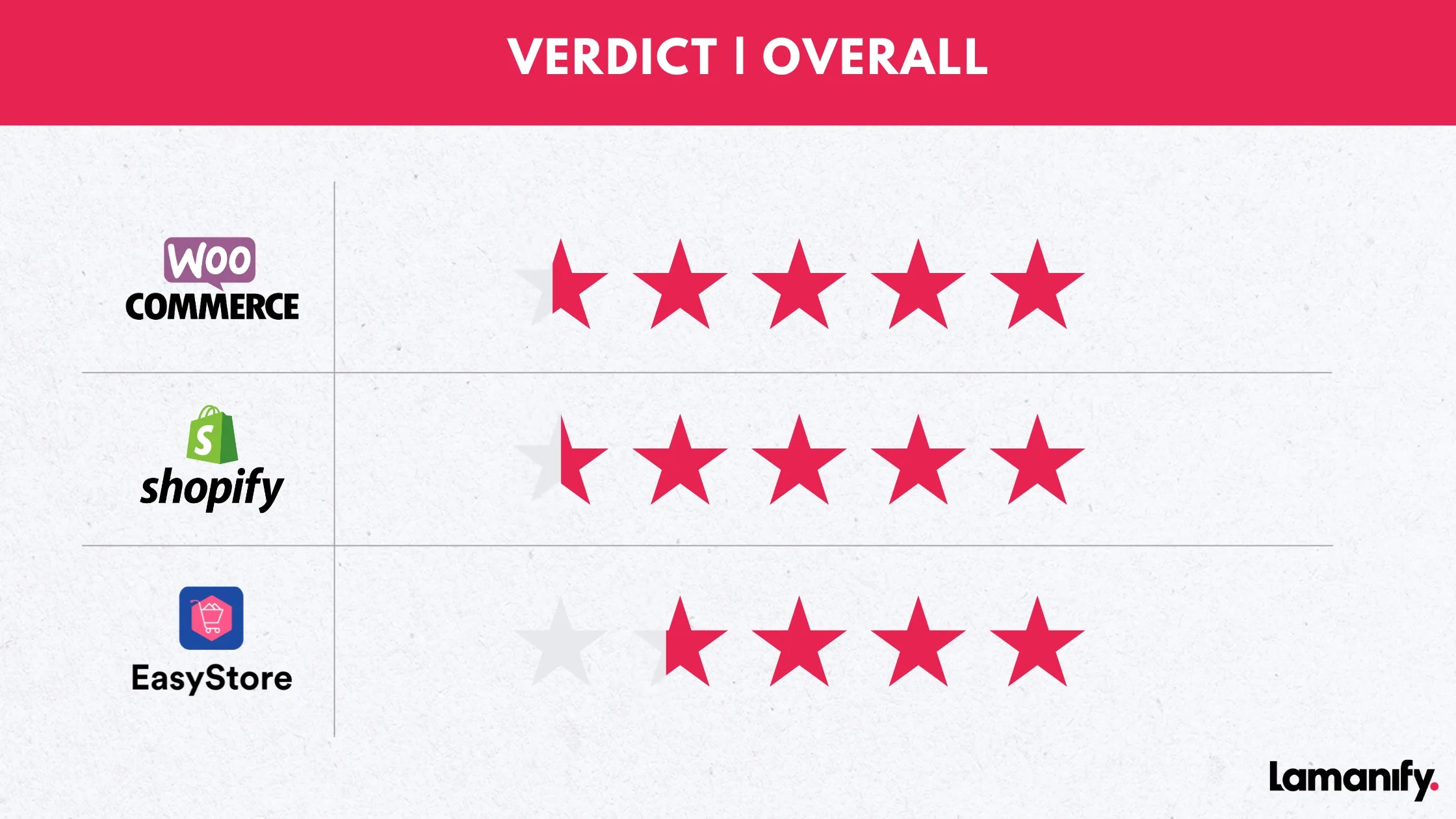
Below are answers to some commonly asked questions about Shopify, WooCommerce and EasyStore that users have shared with us.
Shopify and EasyStore operate as a service, providing software and website hosting for your online store while handling backups, security, and maintenance. While Shopify is more expensive than EasyStore, EasyStore provides local Malaysian-based support for most of your requirements.u003cbru003eu003cbru003eIn contrast, WooCommerce is a self-hosted eCommerce platform requiring a hosting account and domain name, with store management handled by the user. u003cbru003eu003cbru003eWoocommerce offers ultimate flexibility in terms of the design and functionality of your website, so you can create an online store based on your specific requirement. We encourage you to hire a dedicated web developer or agency to maintain the WooCommerce platform.u003cbru003eu003cbru003eBoth platforms enable easy online product sales, payment processing through PCI-compliant third-party gateways, and inventory management.
WooCommerce holds the title of the world’s most popular eCommerce platform. According to u003ca href=u0022https://trends.builtwith.com/shopu0022 target=u0022_blanku0022 rel=u0022noreferrer noopeneru0022u003eBuiltWithu003c/au003e, WooCommerce is utilised by 23% of the top 1 million websites, with Shopify trailing at 21%.u003cbru003eu003cbru003eWooCommerce operates on WordPress, the most popular website builder, powering over 43% of all websites on the internet.u003cbru003eu003cbru003eWhile EasyStore only exists locally in Malaysia, the platform still gains popularity amongst local users who seek cheaper options with a local support system.
Yes, the Shopify Starter Plan can be integrated with WordPress by installing Shopify’s Buy Now button, directing users to the Shopify cart for checkout completion.u003cbru003eu003cbru003eHowever, this implementation can be complex and may not provide the best user experience. If using WordPress, plugins like Formidable Form allow for online payment acceptance without installing a shopping cart plugin like WooCommerce.
All three, Shopify, WooCommerce, and EasyStore, are leading eCommerce platforms on the market.u003cbru003eu003cbru003eOther eCommerce services that offer platforms as services, similar to Shopify include BigCommerce, Squarespace, Wix, and more. u003cbru003eu003cbru003eAlternative WordPress plugins for WooCommerce include MemberPress, WPForms, Easy Digital Downloads, and others.
WooCommerce provides greater flexibility due to its more extensive extensions library. u003cbru003eu003cbru003eRunning on WordPress allows for simultaneous use as a blog and business website. It is compatible with all email platforms like Constant Contact, Mailchimp, and more. Website optimisation is easily achieved using SEO plugins like All in One SEO or Yoast SEO.u003cbru003eu003cbru003eAdditionally, a wider variety of WooCommerce themes can be found in the free WordPress.org theme store. The platform also allows for easy utilisation of tools to enhance conversions and recover abandoned carts.
In the competitive world of eCommerce platforms, Shopify, WooCommerce, and EasyStore each offer unique features and benefits that cater to different business needs.
Shopify delivers a user-friendly, all-in-one solution with managed hosting and seamless scalability, while WooCommerce provides a flexible, open-source platform built on WordPress, granting merchants more control over their store’s design and functionality. On the other hand, EasyStore focuses on simplicity and localisation, making it a great choice for small businesses seeking an easy-to-use platform with regional payment and shipping options.
When choosing the right eCommerce platform for your online store, it’s crucial to consider factors such as customisation, scalability, pricing, and the availability of third-party integrations. Each platform has its strengths and weaknesses, and the best choice will depend on your business’s unique requirements and goals.
If you’re looking for expert guidance on selecting and setting up the perfect eCommerce platform for your business, don’t hesitate to contact Lamanify. Our team is a specialist in Woocommerce and ready to assist you in navigating the world of eCommerce, ensuring you make the right choice and launch a successful online store. Get in touch with Lamanify today, and let us help you bring your eCommerce vision to life!



